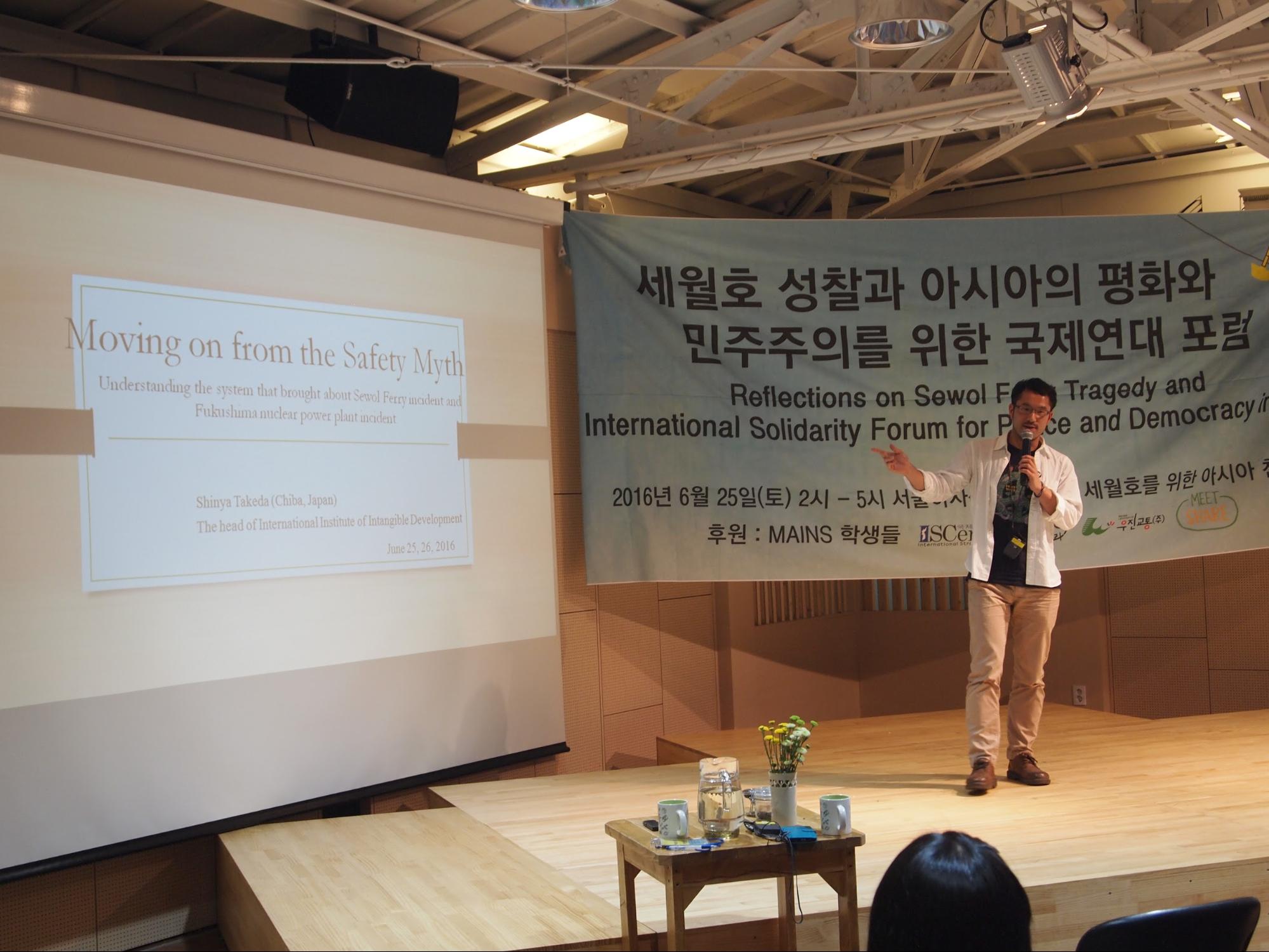"Reflections on the Sewol Ferry Tragedy and International Solidarity Forum for Peace and Democracy in Asia"
Reflections on Sewol Ferry Tragedy and International Solidarity Forum for Peace and Democracy in Asia
On June 25th, the 800th day of Sewol Ferry Tragedy, the Asian Friends of Sewol organized a forum connecting the Sewol Ferry Tragedy with other tragedies and issues around Asia. Participants had an opportunity to write postcards to the Sewol families, sign the petition demanding truth and revision of the special Law, and take a picture with a sign supporting these demands. Inside the forum hall, we sold Nepalese tea, Chia, to fundraise.
The forum started with an opening song by the Sungkonghoe University MAINS students from Myanmar, Nepal, Pakistan, Mongolia, Thailand, Sri Lanka, and Korea. Then Yoo Kyung-geun, father of Danwon high school student Ye-eun and leader of the 416 Sewol Families for Truth and A Safer Society gave the opening remarks. He explained how the 416 Sewol Families was established to reveal the truth, demand the punishment of those responsible, and a fundamental solution to prevent repetition of the tragedy. During the past 26 months the families were able to pass a Special Law which created a Special Committee to investigate the truth. However, the government has been uncooperative even obstructing the investigation. On October, an international conference will be held to demand a standard system for victims of disasters or tragedies so that everyone can receive equal and fair treatment regardless of nationality, race, or gender.
The first presentation was by Naw Yuzana Thinn from Myanmar. She compared Myanmar’s Cyclone Nargis in 2008 with the Sewol Ferry Tragedy. She explained that while the cyclone was a natural disaster, the government’s failed response turned it into a man-made one. Not only had the military government ignored warnings from a climatologist before the disaster, but it also had neglected its responsibilities after the disaster such as providing relief supplies or distributing international relief supplies. Therefore, social trauma from the disaster and its handling prevailed through society. Likewise, after the Sewol Ferry Tragedy, surveys showed that the level of social distress increased drastically a year after the tragedy. So she suggested solidarity in demanding that the governments carry out their responsibilities and roles, remember the incident and victims by keeping records, and recover social empathy.
After the first presentation, Namrata Funda Parvaiz recited the poem “Ma” to commemorate the victims of all disasters. In the poem, a son tells his mother that he will always be with her.
Niwash Gautam presented on child trafficking in orphanages in Nepal. Nepal has lots of orphanages with kids from poor families. The owners keep the children but actually some of them use the children to earn money. Even though the government and the related institutions are aware of this problem, corruption makes them overlook it. The government neglects its responsibilities and focuses more on economic development and profits. That is the core cause of child trafficking Nepal and the Sewol Ferry Tragedy.
Afterwards, two students from an alternative school and one university student shared their personal testimony about the Sewol Ferry Tragedy. They were almost the same age as the High School students killed in the Sewol Ferry Tragedy. They shared the shock they felt when they learned news of the accident and their anger when they witnessed the government’s response and mainstream media coverage. This has fueled their desire to support the struggle and fight for a better society.
The last presentation was done by Shinya Takeda. He explored the meaning of development through the Fukushima Nuclear Meltdown and the Sewol Ferry Tragedy. Even though the nuclear meltdown was caused by an earthquake and tsunami, it was also caused by a money-oriented society. To prevent the future disaster, he suggested redefining development with the more holistic “intangible development” that would allow groups, communities and nations to define their future in a holistic and integrated manner, stressing values such as participation, transparency and accountability.
The last activity was composing and performing a song together to show support and heal each other through music. Everyone – presenters, participants, Sewol families, and staffs – formed a big circle then started by playing a rhythm followed by singing.
The forum finished with remarks from the Sewol Families. Park Ye-na, the sister of a victim, said, “Although 2016 is the world with a lot of convenience, people do not make effort to live together or have compassion for others. We should not stay silence simply dismissing another person’s problem as their business. If someone’s rights were infringed or lives were taken, we should act. We should show solidarity to each other and protect valuable lives.”
Also Choi Yu-na, a sister of a victim, said, “We can keep democracy only when we make our voice heard. I realized this fact after I lost my brother. So I try to overcome my personality and let people know what is wrong. If democracy can be ignored in Korea, it can happen everywhere else. I hope everyone, regardless race and nationality, has interests in keeping a valuable democracy.”
Lastly, Im Young-ho, an uncle of a victim, said “We are all in Sewol Ferry. I dream a day when we can ride safe Sewol ferry and live together.”






